It’s time to decarbonize with heat pumps
The energy demand for heating and cooling has risen worldwide for years and now accounts for 50% of global energy consumption and 40% of CO2 emissions. This is not sustainable in terms of cost efficiency and climate protection. Heat pumps are one of the most practical ways of lowering heating costs and CO2 emissions for utilities and process industries. Powered by renewable electricity, a large-scale heat pump is an economical way to fully decarbonize your heating and cooling supply. Heat pumps also enable sector coupling and can help to balance renewable energy surpluses. The technology is well known, extremely reliable, robust, and efficient.
How it works: amplifying and transferring thermal energy
A heat pump extracts heat from a low temperature source like water, air, or waste heat from machinery, amplifies it to a useful high temperature, and transfers it to where it is needed. The principle is based on a closed-loop refrigerant cycle with compression and expansion of the fluid and can be operated in both directions to deliver heating or cooling. Electricity is needed to power the compressor. Efficiency is measured as a ratio of the heat output to the power input. This is called the coefficient of performance (COP). Powered by renewable electricity the heat pump can supply carbon neutral heating or cooling.
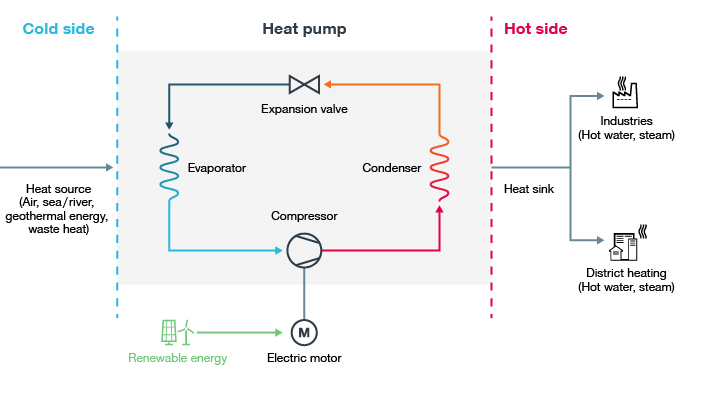
Compressor expertise
The heart of the heat pump is the compressor. We have decades of experience in developing compressors for the most demanding conditions. Our wide range of designs ensures we can tailor each pump to the customer’s specific power, temperature and space requirements.
Our high-temperature heat pumps bring the economic and climate-friendly benefits of domestic heat pumps to large-scale industrial applications. To ensure a process steam supply, we can offer a combined heat pump / vapor compressor or a separate vapor compressor skid that provides the required process conditions.
MAN heat pumps: temperature and power output
We scale our heat pump solutions to the temperature and power needs of our customers. The temperature supply range of 60 - 280°C is suitable for heating water and liquids, process heating, or steam production. The power output ranges from 10 megawatts thermal (MWth) to above 90 MWth per heat pump unit. Higher outputs can be achieved with several heat pumps in parallel operation.
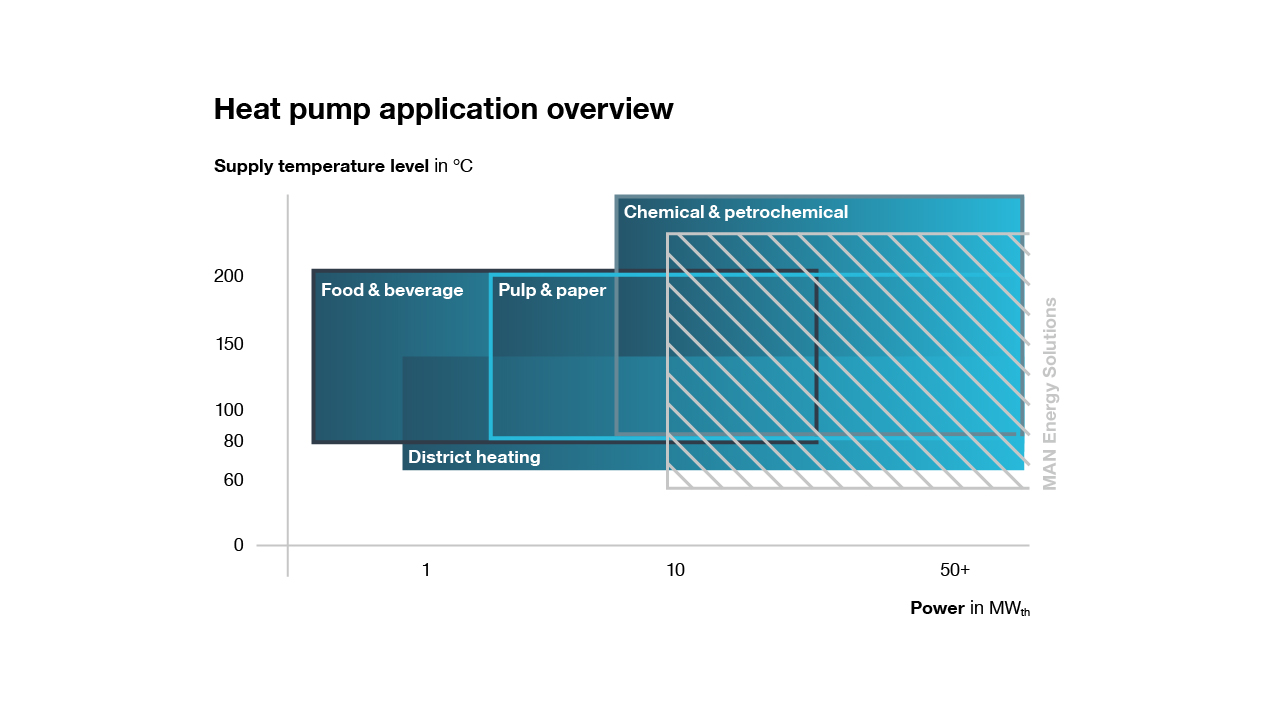
The right heat pump for your business
Each MAN heat pump solution is individually designed to meet your specific needs. Here are some examples of the most common applications.
Using waste heat and renewable energy you can heat whole districts and replace fossil fuels.
Read moreSave on CO2 taxes as well as on fuel. MAN heat pumps make your processes more sustainable and economical.
Read moreBy converting waste heat, heat pumps offer a practical way to electrify processes and reduce CO2 emissions.
Read moreReduce CO2 emissions and energy costs by using waste heat from drying to produce steam with heat pumps.
Read more
District heating
District heating already has environmental, economic, and social benefits over individual heating. Powering district heating with heat pumps brings additional advantages. A large-scale heat pump can upgrade heat from sources such as sewage treatment plants
or river water to the level of district heating, thus replacing fossil fuels. In district heating, the heat pumps are generally operated with water. A special case here, however, are old US steam heating networks, which are operated with steam.
- Reduce CO2 emissions
- Enable electricity-based heat supply
- Integrate renewables and balance electricity grid
- Make energy systems more flexible and efficient
Process industry
The process industries not only produce but also consume enormous amounts of oil and gas. Heat pumps offer a practical way to electrify processes and reduce CO2 output. Heat pumps can convert low and high temperature waste heat to useful high-quality process heat or steam. In the process industries, heat pumps operate on steam.
- Reduce CO2 emissions
- Reduce plant energy costs
- Improve energy efficienc
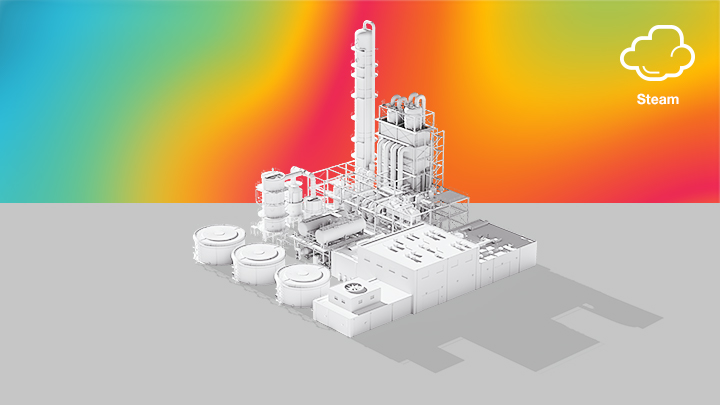
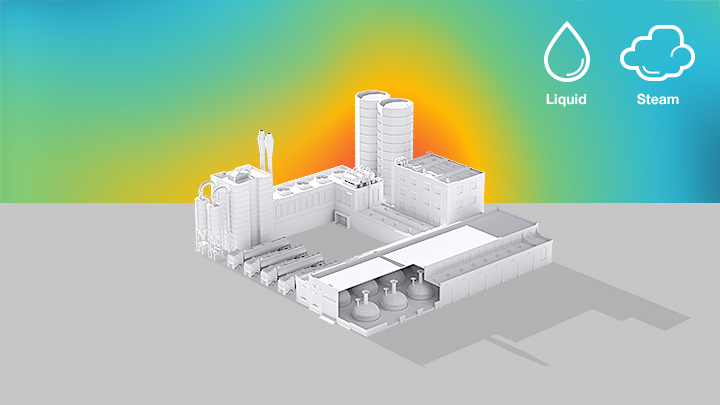
Food & beverage
Food and beverage manufacturing requires vast quantities of thermal energy, for both heating and cooling processes. MAN heat pumps contribute to making these processes more sustainable and economical and to reducing dependence on fossil fuels. Manufacturers can save on CO2 taxes as well as on fuel. Due to the possibility of using water or steam, heat pumps can be used in all food & beverage sectors.
- Produce heat and cold simultaneously
- Reduce CO2 emissions
- Improve energy efficiency and reduce costs
Pulp & paper
Pulp and paper production is one of the most energy-intensive industrial processes. Drying pulp, paper or tissues accounts for some 70% of the energy used in this sector. Industrial heat pumps can produce the steam necessary for the drying processes by applying electricity from renewable sources to waste heat streams from the drying process. Heat pumps not only decarbonize the energy supply but reduce plant energy costs. The pulp & paper industries can benefit from the use of heat pumps wich are running on steam.
- Reduce CO2 emissions
- Reduce plant energy costs
- Improve energy efficiency
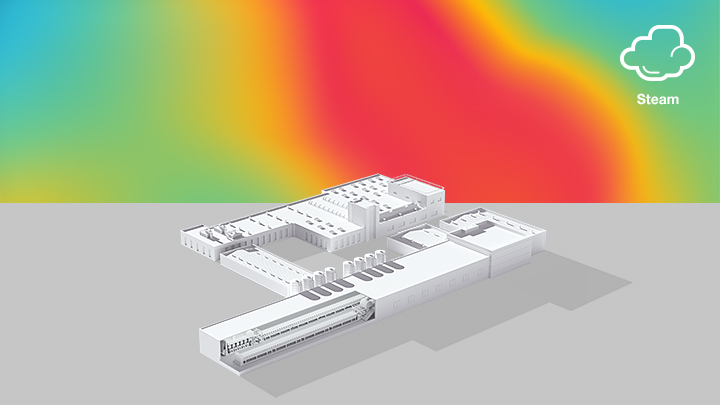
Contact our experts
Decarbonize with heat pumps from MAN Energy Solutions
Using renewable electricity to run large-scale heat pumps is an economical way to lower emissions in the carbon-heavy global heat market. There are direct cost savings in terms of fuel costs and carbon taxes.
Our experts know a lot about heat pumps and will be happy to help you put together the perfect system solution for your requirements.
Join our MAN ExpertTalks and events
-

Energy & Storage
MAN Heat pumps for district heating
MAN ExpertTalkHeat pumps are one of the mainstays of our energy supply and are becoming increasingly relevant for a sustainable future.
We are pleased to invite you to our MAN ExpertTalk, which will focus on MAN Heat pumps solutions for district heating.
First, we will be looking at the development of the heat pump market in Europe and the USA and presenting our transcritical and vapor compression cycle technologies. We will also be looking at the potential for sector coupling, explaining our position on PFAS, outlining plans for butane and propane, and reporting on the Esbjerg and Aalborg projects.
We are looking forward to an exciting exchange with you in our live session.
Your host will be Raymond Decorvet.
-

Heat pumps
MAN Heat pumps for industrial processes
MAN ExpertTalkWe are pleased to invite you to our MAN ExpertTalk, which will focus on MAN Heat pump solutions for industrial processes.
First, we will dive into the decarbonization of industrial heat production and power-to-heat solutions for the process industry. We will look at heat and steam production and give you an overview of our vapor compression cycle heat pump technologies with insights into the latest use cases.
Your hosts will be Lothar Wallscheid and Jörg Freckmann.
-

Energy & Storage
Boosting energy efficiency and cutting costs in the pulp and paper industry
MAN ExpertTalkWe are pleased to invite you to our MAN ExpertTalk, which will focus on MAN Heat pump solutions for pulp and paper industry.
Our MAN ExpertTalk will focus on the possibilities for decarbonization as well as energy efficiency and cost savings. We will take a look at the current challenges and solutions in the market. Furthermore, our listeners will be shown how broad our solutions for the pulp and paper sector are and in which projects our energy systems and products are already being used.
Downloads
Continue reading
MAN Energy Solutions is now Everllence.
We have adopted a new brand name and moved to a new domain: www.everllence.com. This page will also be relocated there shortly. We are working on shifting all pages to www.everllence.com.
